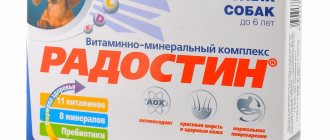When feeding naturally, the intake of nutrients should be regulated by selecting the diet. When consuming ready-made industrial food, it is better not to use vitamins for your German Shepherd, since such canned food is usually completely balanced.
Important! Vitamins can be given to a puppy only after examination by a veterinarian and passing the appropriate tests.
You cannot use vitamins for German Shepherd puppies just like that, because it is winter or the pet is growing quickly. There must be serious reasons for giving these substances. An exception may be poor nutrition, when it is not possible to feed the puppy with meat by-products or ready-made food.
Essential vitamins
In total, more than 30 types of vitamins are produced for German shepherds, but the most important are groups A, B, C, D, E. Their deficiency is detected most often and leads to serious illnesses; their absence has a particularly serious impact on puppies weaned from their mother at 2 months and under.
Vitamin A (carotene)
The body needs it at any age. First of all, it is needed for normal vision, since carotene is part of the retina. With vitamin deficiency, growth retardation, inflammation of the eyes and other mucous membranes, and bronchitis are observed. A clear sign is dryness of the eyeball.
B vitamins
This is a whole range of substances. A puppy needs all these vitamins, since each of them has its own unique meaning:
- B1 (thiamine). Responsible for the conduction of nerve impulses and muscle contraction. Deficiency leads to polyneuritis, convulsions, and paralysis.
- B2 (riboflavin). Deficiency leads to hair loss on the back, dermatitis, clouding of the whites of the eyes, muscle weakness and cuts.
- B5 (pantothenic acid). Responsible for metabolism in hair follicles. In its absence, the puppy’s hair turns gray and falls out.
- B6 (pyridoxine). The vitamin regulates the creation of proteins, so its deficiency leads to growth retardation, anemia, and systemic inflammatory phenomena.
- B12 (cyanocobalamin). Responsible for hematopoiesis. Deficiency leads to lethargy, pallor, severe thirst, and impaired bowel movements and urination.
- BC (folic acid). Due to deficiency, anemia, leukopenia occurs, thinness, stunting, dandruff and dry skin are observed.
Vitamin C (ascorbic acid)
It is an activator of almost all enzymes. Ascorbic acid is responsible for the body's immune response and hematopoiesis. A deficiency within 2 months leads to a severe decrease in immunity, scurvy, and anemia.
Vitamin D (calciferol)
Responsible for the absorption of calcium and phosphorus, it is beneficial for bones and joints. In its absence, these trace elements are washed out from the skeleton, causing it to become soft and lose strength. As a result, the bones become bent over 1-2 years, the structure of the joints is disrupted, and arthrosis occurs.
Vitamin E (tocopherol)
It must be included in the diet for puberty. In the absence of tocopherol for 6 months or more, infertility occurs. With vitamin E deficiency, complications develop in a pregnant bitch. The central nervous system is also affected, causing paresis and paralysis.
How to install ears yourself
How many times have your German Shepherd's ears gone up and down again? How do you know that they will get up on their own in a few months? Is it possible to install them yourself?
At the age of a puppy from six months, if the ears are already raised and ready to stand up, you can help them:
- Inspection for weak spots in the cartilage. We palpate with two fingers the entire area of the auditory organ from tip to roots. Usually the weak points look like spots, but if there is a crease, they can appear as stripes. When you press this point, the ear should immediately rise.
- If there are no weak points or they are in the upper part, then the ears will stand up on their own, you just need to continue to feed the puppy correctly.
- If there was a crease or the weak point is located at a distance of approximately 2/3 from the root, then it is necessary to glue the ears.
Improvised means and medicines
There are several ways to glue the ears of a German Shepherd. The first step is to trim the fur on them, on both sides. Then choose one of the proposed gluing methods.
| Method | Materials | What actions to take |
| Wrapping on curlers | Foam rollers (without plastic retainer, it must be removed) | Place the curlers on a blunt pencil about 3 cm. |
| Thin patch, better wide | Apply glue to the surface of the curler ¾ around the circumference. Do not allow glue to drip. | |
| Medical glue | Wrap the ear around a lubricated curler, which must be inserted with a gap so that the dog can hear | |
| Dull pencil | Secure everything well with adhesive tape | |
| Distract the puppy from the new head structure for 5-10 minutes. It will come off on its own within a week if it is not removed by the pet earlier. | ||
| Wrapping on cardboard | Cardboard in the shape of ears without sharp corners | Tape the cardboard to the inside of the ear. |
| Masking tape or plaster | Wrap it around the bottom so that it stands up. | |
| The structure will last for 24 hours, after which it will fall off painlessly. But the puppy will definitely try to tear it off. | ||
| Ear implants | Special medical implants | Installed in veterinary clinics. Need specialist advice. |
Finally, some advice from experts for owners of German Shepherds:
- Don’t worry if your shepherd’s ears fall down when teeth change, and then rise again - this is considered within normal limits.
- They should stand up on your pet's own between the ages of 8 weeks and 6 months. After this, it is recommended to install them yourself.
- Don't be afraid of gluing your ears or wrapping them. When done correctly, this will stimulate the ear muscles and help your German Shepherd.
- Carry out preventive examinations of your pet. You need to make sure that he is healthy, eating properly and has enough essential vitamins and minerals for normal development.
- You cannot start the process when your ears stand up. Watch it carefully and take timely measures, otherwise it may not get up at all.
- Don't be afraid to ask a professional, veterinarian, or breeder with questions.
Vitamin content
Products of animal and plant origin do not contain vitamins for a shepherd in equal quantities.
Vitamin A (carotene)
Carotene is a plant pigment and is found in red root vegetables (carrots, beets) and vegetables (tomatoes). A large amount of it can be found in egg yolk. However, exactly how much depends greatly on the feeding of the bird and the time of year. For puppies, the main source will be milk and butter, but the concentration in these products varies significantly.
B vitamins
The concentration of each B vitamin varies in different foods:
- B1 (thiamine). Contained in cereals, legumes, root vegetables. For dogs, liver, kidneys, and heart are more suitable as a source;
- B2 (riboflavin). The same meat by-products are rich in it;
- B5 (pantothenic acid). Found in rice, liver, egg yolk, potatoes;
- B6 (pyridoxine). Found in liver, eggs, spinach;
- B12 (cyanocobalamin). They are rich in dairy products and eggs, as well as beef liver and kidneys;
- BC (folic acid). Found in green leaves, cabbage, lettuce, spinach. There is a lot of it in the kidneys and liver.
Vitamin C (ascorbic acid)
It is found in large quantities in berries, red vegetables and fruits. For dogs, the liver, pituitary gland, adrenal glands, and eye lenses are more suitable sources. Puppies 4 months and younger can be given milk; it contains ascorbic acid, but in small concentrations.
Vitamin D (calciferol)
It is found in large quantities in the liver of fish. However, the main source is ultraviolet rays, since vitamin D is synthesized in the skin of the animal independently, but under the influence of sunlight.
Vitamin E (tocopherol)
The source is plants; there is very little of it in animal products. For adult pets, vegetables are the best option, but puppies 3 months and younger are sometimes capricious. If the dog is not yet accustomed to these products, then some amount of tocopherol can be extracted from the liver, albeit a little.
When should a German Shepherd's ears stand up?
This question is not uncommon, and there are certain reasons for it. Unfortunately, even experts who should have come to a common point of view long ago disagree on when the ears should go up.
One side of the debate is inclined to believe that these dogs’ ears should acquire the correct position between the ages of two and five months. Others say no earlier than six months.
There are exceptional cases when a puppy’s ears permanently rise at eight months. But it is by no means worth taking such cases as a rule.
When this wonderful moment occurs, it is very important to pay attention to how well the ears fit the existing breed standards. A German Shepherd's ears should be medium-sized and pointed. They should be planted on a wide base. The direction of the shepherd's ears is only forward and upward.
Any deviations from the standards are considered a violation and may be considered a culling of the breed. Including folded ears, drooping ears and distortions in their direction. That is why the moment when the puppy’s ears rise requires special attention and care for the baby.
Treatment with vitamins
Vitamin B2 can be used to speed up metabolic processes, wound healing, and treat inflammation of the mucous membranes. Nicotinic acid is used to eliminate dry skin, enteritis and colitis, to alleviate the symptoms of canine distemper in the later stages. Vitamin B12 is used to treat liver damage and maintain hematopoiesis.
vitamin seeds
Calciferol should be given to German Shepherd puppies to treat rickets. But it is administered only in combination with calcium and phosphorus. Ascorbic acid is used for infectious diseases; it is also effective for scurvy and anemia. Vitamin E is used to mitigate or eliminate postpartum complications.
Vitamins A, C, E have a positive effect on sulfur metabolism in the skin and hair growth. Pantothenic acid stimulates hair growth and prevents early greying. And vitamins A, C, B12, B2 will help get rid of dandruff.
Essential vitamin supplements for German Shepherds: from babies to seniors
The German Shepherd, like any other purebred dog, for the full development and proper functioning of the musculoskeletal system, as well as maintaining the immune system, must be given various vitamins and supplements from an early age.
There are vitamins that are designed specifically for German Shepherds. You can buy vitamins in tablet form, and your pet can get them through food. But it is important to remember that in order to know what vitamins to give your pet, you need to pay attention to many factors: age, presence of diseases or abnormalities, level of activity, etc.
How to Give Calcium to a German Shepherd Puppy
You need to remember the main rule - calcium for a German Shepherd puppy is always used together with phosphorus. If you give calcium at normal phosphorus levels, then calcium begins to be washed out of the bones and rickets develops. The ratio of calcium to phosphorus should be 1:1 or 2:1; a combination of 3:1 is already dangerous and leads to rickets.
This can be solved by giving calcium glycerophosphate, which contains both microelements.
Reasons are also needed for giving calcium supplements, since an excess of it in the diet leads to hypercalcemia. Which is accompanied by lack of appetite, severe thirst, colic and constipation, nausea and vomiting. As a result, brain disorders, polyuria, and increased coagulation develop.
What vitamins should be given to puppies and adult German Shepherds?
When feeding naturally, the intake of nutrients should be regulated by selecting the diet. When consuming ready-made industrial food, it is better not to use vitamins for your German Shepherd, since such canned food is usually completely balanced.
Important! Vitamins can be given to a puppy only after examination by a veterinarian and passing the appropriate tests.
You cannot use vitamins for German Shepherd puppies just like that, because it is winter or the pet is growing quickly. There must be serious reasons for giving these substances. An exception may be poor nutrition, when it is not possible to feed the puppy with meat by-products or ready-made food.
Vitamin supplements for dogs
There are many vitamin complexes on the domestic market. Below are the best price-quality options for what vitamins to give your puppy:
- "Top 10 for dogs";
Available in tablet form, it contains a huge amount of vitamins and microelements. The most important are vitamins A, D, E, as well as all B vitamins. The composition contains calcium, phosphorus, potassium, sodium, iodine and other trace elements. Used for many diseases. Dosage for adult dogs – 1 tablet, for puppies – half a tablet.
- "Tetravit";
The drug is named so because of the complex of vitamins A, D, E and F, which are found in the oily liquid. Available in solutions for oral use and in injection form. The product is used for pets with low resistance, exhaustion, during and after illness. Dogs are administered intramuscularly or subcutaneously 0.2-1 ml.
- "8 in 1 Excel Deter";
The drug is intended to wean dogs and puppies from eating feces and other foreign objects. Contains a number of vital acids and vitamins (B1, B2, B6). Small dogs up to 10 kg of weight are given 1 tablet per 3.5 kg of weight, large pets - a tablet per 7 kg. The drug is fed with food.
- "Laveta Super for dogs";
Contains a complex of carotene, calciferol, tocopherol and B vitamins. The solution is given orally. The dosage for pets up to 10 kg is 1 drop per 1.5 kg, and for large animals - a drop per kilogram. Before use, the product can be mixed with water.
- "SA-37";
Contains almost the entire list of useful substances. The composition includes completely group B, as well as vitamins A, C, D, E, K. In addition, there is calcium, phosphorus, potassium, iodine and other mineral supplements, antioxidants and proteins. Puppies are given 1-4 g/kg, and adult pets – 1-2 g/kg.
- "Farmavit Neo for dogs."
A group of drugs that includes complexes for puppies, adult animals and pregnant bitches. The composition includes all necessary vitamins and microelements. The dosage of the drug SK for an adult German shepherd is 3 kg tablet, the drug SK-BK for pregnant bitches is 1-2 tablets. per 3 kg, and for lactating women – 2-4 tablets. per 3 kg, puppies are given SK-M in the amount of 1 tablet. by 2 kg.
Vitamin and mineral supplements
Vitamin A
High content in apples, carrots, liver, milk. Responsible for the proper metabolism of the skin and mucous membranes. If a German Shepherd does not receive enough vitamin A, then its immunity sharply weakens, and the functions of the skin and mucous membranes become impaired.
Vitamins B
This group includes vitamins B1, B2, B3, B6, B9, B12. Contained in liver, yeast, dairy products. They are responsible for general metabolism - fats, carbohydrates, proteins. If there is a lack of this group of vitamins, the dog will have serious problems with its coat.
Vitamin C
This vitamin is called ascorbic acid and is found in tomatoes, cabbage, liver, kidneys, and potatoes. Responsible for metabolism in tissues that perform the function of connection. Also promotes good calcium absorption. A lack of ascorbic acid threatens weakness in the connections of body tissues and leaching of calcium from bones.
Vitamin D
High content in fermented milk products, cottage cheese, cheese, vegetable oil, seafood, and some herbs. Responsible for the absorption of calcium and phosphorus. Due to deficiency, rickets may develop.
Vitamin E
Contained in vegetable and olive oils. Responsible for carbohydrate metabolism, hormonal levels, and fat breakdown. A deficiency in the body can cause problems with the heart, muscles, and bearing offspring. Can lead to stillbirth and, as a result, infertility.
Vitamin K
High content in cabbage, nettles, lettuce. Responsible for blood clotting.
It is also good to add the following vitamin-containing substances to your German Shepherd’s food:
The drug "Trivit". Contains vitamins A, D, E in oil. Add five drops to your German Shepherd's food daily.
Brewer's yeast is extremely useful for good metabolism and excellent condition of the dog's coat and skin. They also promote an excellent appetite.
Seaweed and cabbage contain a huge amount of vitamins and microelements necessary for the health of a shepherd dog. The rich pigment of a dog’s undercoat is the merit of algae and seaweed.
Dried carrots are also perfect for improving coat pigmentation. It is also responsible for improving the condition of the skin.
Garlic flour has a direct detrimental effect on worms and internal parasites.
Meat and bone meal contains phosphorus.
For the prevention and treatment of disorders in ligaments and tendons, products and substances containing gelatin are well suited.
Pharmaceutical sulfur improves the structure of the villi in the undercoat.
For general strengthening of the body and the prevention of various diseases and infections, multivitamin complexes for puppies are perfect.
All of these ingredients are an integral part of your dog's healthy diet. Thanks to them, the German Shepherd will always feel good and look great.
If you don’t know or have any doubts about what vitamins, tablets, or minerals to give your puppy or adult German Shepherd, be sure to consult your veterinarian for advice.
What biologically active substances do you give your dog?
source
Something went wrong?
It is very important to know the reasons why a German Shepherd's ear may become irregularly shaped and because with this information you can prevent this problem.
If we consider heredity, then the cause of the problem can be divided into congenital and acquired:
- If the puppy's parents had similar troubles in childhood, then the offspring will most likely face the same problems.
- Often, the cause is a disruption of the animal’s musculoskeletal system.
- Mechanical injuries.
- Infectious diseases.
- Hypothermia.
- Lack of vitamins and minerals.
Also, similar problems in a puppy can arise due to diseases that slow down the development of the body, excess weight or low physical activity of the animal.











